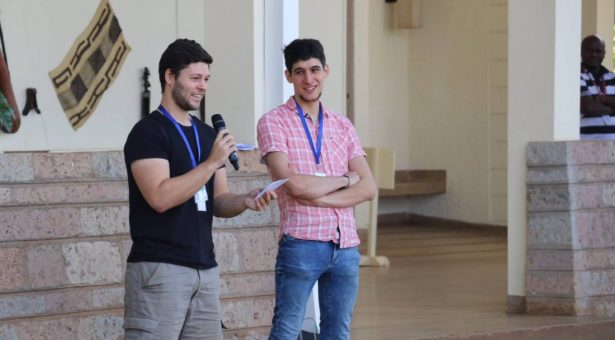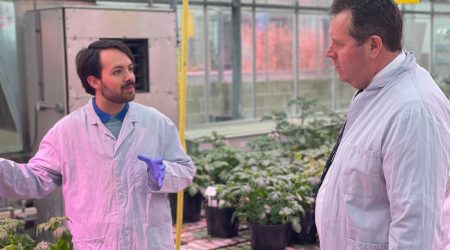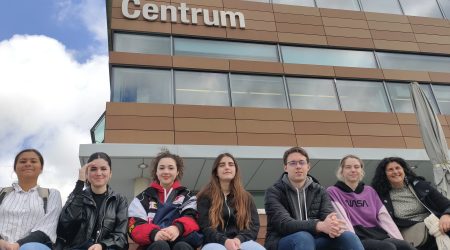A PhD Internship in Kenya

PhD student Danny Ward has just returned from a 3-month placement in Kenya as part of his PhD, so we asked him what it was like to head out of the lab.
“Over the past 3 months, I have been in Kenya as part of my PhD program, as part of the Professional Internships for PhD Students (PIPS) scheme, where I was given the opportunity to work on projects related to science communication, science media production and international capacity building.
For the bulk of my time there, I was in Nairobi, Kenya, where I worked to create an online bioinformatic and soft skill training video series.
This project was produced for BecA-ILRI, an international collaborator of the John Innes Centre. This video series targets early career researchers and students of low- and middle-income countries, especially those across the continent of Africa. Previously, there were very few online resources which directly reached out to such countries. This means, many common scientific problems faced in these communities have been left unaddressed.
The video series focuses on both theory and application of key bioinformatic and soft skill concepts in relation to real issues faced by those of these countries. One such example was addressed in the pilot episode and explors bioinformatic techniques analyses of genetic sequences in relation to the cassava plant, a staple food crop across many African nations.
I was involved in all aspects of video production including the script writing, filming and editing. I also created a technical user guide which will allow staff and future PIPS students to continue video production of this series.
Following this, my internship ended with the organisation and running of “AfriPlantSci19” in Kilifi, a plant science training course for early-career African researchers.
I worked with five other PIPS students and staff from the John Innes Centre and the University of East Anglia. While there, I led a session with fellow PIPS student Hans Pfalzgraf on synthetic biologic and ‘hackster’ engineering. I demonstrated during a variety of laboratory practicals and I assisted during interactive workshops to facilitate the learning of the students. Alongside this, fellow PIPS student James Canham and I were responsible for photography and videography of the course, along with social media management.
The idea of the internships is to give PhD students a broader range of skills and experiences outside of the lab. This will help us move into a wider range of careers and will make us more employable once the PhD has drawn to a close. I think this is a fantastic idea and I have gained an awful lot from my internship in Kenya. The amount I have grown and developed over the past few months has been vast. I’ve been able to build both technical and transferable soft skills, many of which will serve me well with the rest of my PhD and beyond.
The internship has also really opened my eyes to the possibilities of a career in science communication, science media and international capacity building. I have enjoyed all three areas more than I could have predicted, I am so grateful to have been given this opportunity to experience them.
I’ve gained a new insight into different career paths away from the lab and have developed a wide variety of skills, including videography, animation, editing and bioinformatics. I really enjoyed learning most about animation. This surprised me as I hadn’t previously thought it would be something which would interest me. After learning these technical skills, I can see a real use for 2D and 3D animation in science communication and I will be incorporating some of these skills through the remainder of my PhD and with my wider outreach work.
Examples of soft transferable skills which I was able to build upon included project management, communication, leadership, creativity and problem-solving skills. I would say the most valuable skill of all for me, however, was improving my science communication. As part of the video production process, I learnt how to best break down complex topics and then convey these topics to a non-expert audience. This personal development will give me the confidence and the experience necessary to better present challenging topics to a variety of audiences in future.
Kenya is an incredible country with friendly people, stunning scenery and impressive wildlife. I would strongly encourage anyone to visit, should the opportunity arise. It will be an experience you will not forget. I know I will hold on to these memories fondly.
One of my favourites moments was part of the AfriPlantSci19 summer school. After a busy week of learning all about molecular plant science, we got the opportunity, as a group, to head to Gedi Ruins by the coastal town of Malindi. The ruins themselves were incredible and an excellent chance to learn more about the rich history of Swahili culture. After finishing a tour of the site, we headed towards the exit. It was here that we were greeted by a group of curious monkeys.
While nervous at first, we all quickly made friends with these inquisitive creatures (or they quickly made friends with us when they noticed we had bananas). They clearly enjoyed the attention.
I am now back in England, ready to head back to the lab and PhD life once again. To all those embarking upon internships, PhDs and PIPS of their own – I wish you the best of luck and I hope this blog will prove useful or interesting to you in some way.
Danny is supported by the UKRI Biotechnology and Biological Sciences Research Council Norwich Research Park Biosciences Doctoral Training Partnership.



